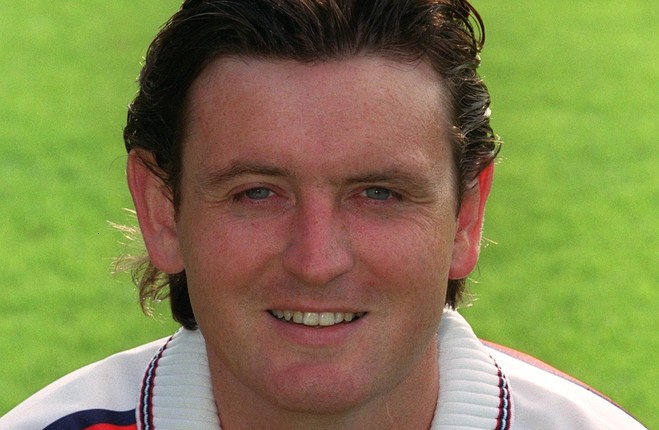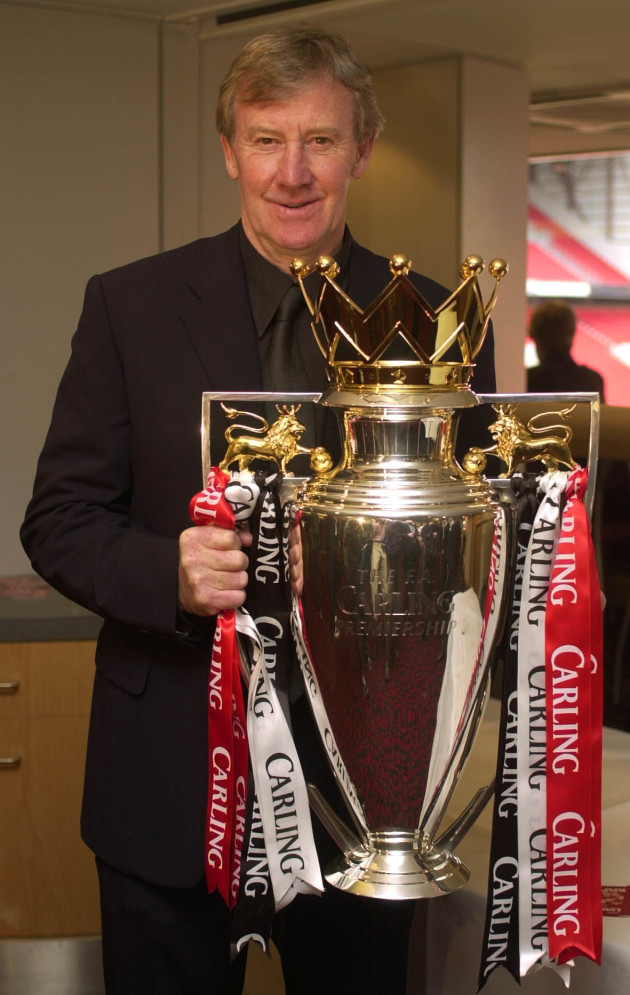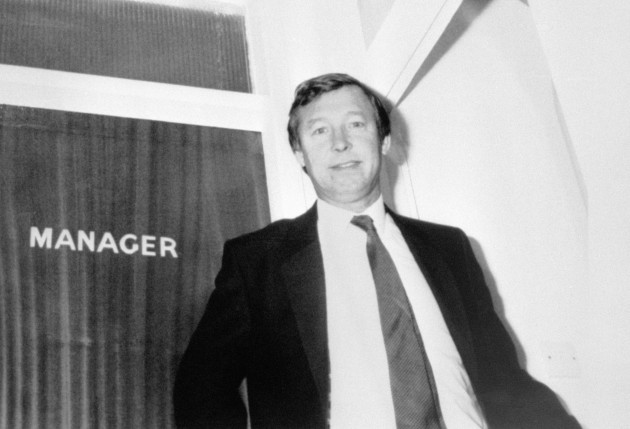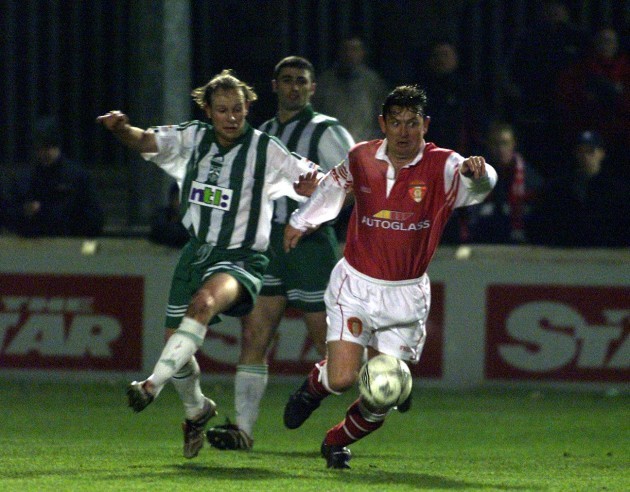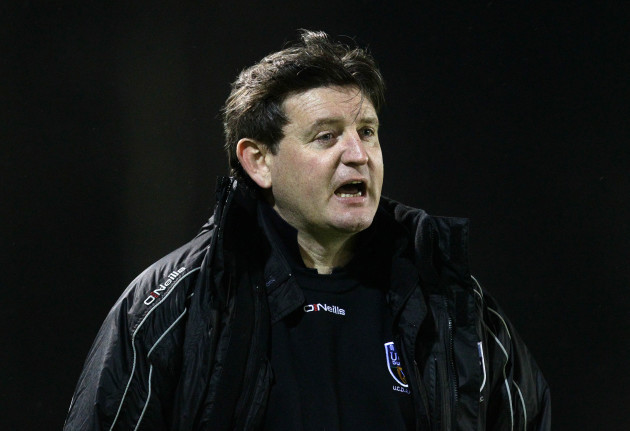FOR MARTIN RUSSELL, it began on the streets of Finglas in 1970s Dublin.
Fellow future League of Ireland stars Pat Fenlon and Ricky McEvoy lived nearby.
McEvoy and Russell both went to the same school, Patrician College, helping them win the Leinster Junior Schools Cup and the All-Ireland Colleges Junior title.
Russell learned his trade playing locally in the road leagues, before signing with renowned Dublin schoolboy club Belvedere.
The youngster consequently worked with some of the most acclaimed underage coaches of that era, including Noel O’Reilly and Vinny Butler, who would give him and a couple of others lifts from Finglas all the way out to Clontarf, where the club were based.
Aged eight, Russell had no alternative than to play at the lowest age group available, U12s, on a full-size pitch.
“We still enjoyed our football, but it was 11-a-side football for eight year olds, which we’re far removed from now,” he tells The42.
“There are small-sided games now, which are a lot better for development for a young players.”
The likes of McEvoy, Kwame Ampadu — currently the assistant coach to Thierry Henry at Montreal Impact — and Curtis Fleming would have been representing Belvedere around that era and went on to have successful careers in the game.
Russell’s performances were impressive enough to the extent that, aged 16, he signed a four-year contract at Manchester United, though even earlier, he was regularly visiting the Old Trafford outfit, lining out for them in friendlies on a Saturday before dashing home in time for a match with Belvedere 24 hours later.
“Ronnie Whelan had gone to my school, Patrician College, and the advice was to stay on and do the Leaving,” he recalls. “The fear back then was there was no full-time training. Where are you going to train, twice a week down in Fairview?
When it goes to five times a week at Manchester United and the fact I had a four-year contract, there was some security in it. So after weighing things up, I thought it was the right time and the move that I wanted to do, and there were a lot of positives.”
Eric Harrison, a coach who would later become renowned as a key figure in developing the famous Class of ’92 players, was the main man Russell worked under.
“He was tough but he always wanted his teams to play really good football,” Russell remembers. “I enjoyed it. I thought he was very fair and he had a good way about him.”
As is generally the case when teenage footballers go abroad, Russell struggled with homesickness at times.
“You look to every chance to get home when you’re playing for the Irish youths or whatever. You look forward to things like that.
“I was the eldest in a big family — there were seven boys. Although I knew the place well and things were fine, you’re missing your family growing up and so forth.
“It’s quite well documented that a lot of Irish young lads struggle for the first few years, and I did as well.
But you get through it. You were playing at Old Trafford. There were a lot of times that you enjoy it, but the times you were away, there are quite a few occasions where you’re wondering what they’re doing at home and you’re missing out on moments. But there was always an Irish contingent at United, so when I first went there, the likes of Derek Murray and Pat Kelch, who were my age, were signed. Derek Brazil and a few lads from the north [were there as well]. There was also in the first team Paul McGrath, Kevin Moran and those lads, so there was always a good Irish feel around the club that helped things.”
Around this period, Russell represented Ireland at the 1984 Uefa European U18 Championship and the 1985 Fifa World Youth Championship.
The Irish squad, managed by Liam Tuohy, also included the likes of Kelch, Derek Swan, Pat and Eamonn Dolan, Eamonn Collins, Martin Bayly and Brian Mooney.
At the Euros, the Boys in Green got as far as the semi-finals, before losing to host nation the Soviet Union.
Ron Atkinson was the manager for the majority of the six years Russell spent at Old Trafford.
The Irish youngster was a reserve-team regular but couldn’t break through into the main side. The closest he came under Atkinson occurred when the manager included him in a pre-season squad to Ireland, where United came up against Shamrock Rovers.
And it was an era where squad rotation was far less commonplace than it is now, so Russell had little option but to go out on loan.
He subsequently made a handful appearances for Birmingham City, who were then in the third tier of English football.
And it was during the loan spell at St Andrew’s, in the last year of his United contract, when Russell discovered that Atkinson had been replaced by a highly thought of young Scottish manager by the name of Alex Ferguson.
“At the time [Ferguson] came in, the results weren’t tremendous. And a lot of the lads who weren’t getting football, a year later, were getting first-team football. The likes of Russell Beardsmore and Mark Robins, who were there and ended up playing in the first team, when I was there a year before, they were struggling to get reserve football. It’s funny how things change.
“To be fair to Ferguson, in the long run, he showed that he was prepared to put the younger player in. And Mark Robins was the lad that got them [the important goal that led] to them winning the FA Cup that year [when he was under pressure].”
He continues: “I remember one incident where I was called into the first-team squad and we travelled down to Southampton. There was another boy, a fella called Tony Gill, and he was called in as well. We were going through the numbers and said: ‘One of us is on the bench.’ It ended up with Tony not on the bench but playing. Of the 18-man squad, I was the odd man out. I think Liam O’Brien might have played in that game as well, it was down at the Dell.
“So because Tony did okay, he was then put in the follow-up squads. He then played and was part of it. The ironic thing was Tony, although he made his breakthrough, he suffered a severe injury, I think it was a bad break and he retired [early] from the game. There were a couple of young lads that were just on the verge of getting chances around that time I was there that also had to prematurely retire from football. So it’s a precarious occupation, and people don’t realise the near misses that some players have.
“When I talk about UCD later and the scholarship programme that I was part of, the holistic approach for the player in the long run is the best option. When you put all your eggs in one basket, it can be a precarious job to be a professional sportsman.”
Still surplus to requirements at United despite the managerial change, Russell was again sent on loan, this time to a top-flight side in Norwich City, though he didn’t play any first-team games there.
Shortly thereafter, the Red Devils accepted a bid from Leicester and Russell joined the Foxes in the second tier.
His first game was against West Ham, who had just signed Liam Brady, Russell’s idol at the time.
Yet his two years at Leicester would prove frustrating overall. He was in and out of the first team, and this lack of stability paved the way for a move to fourth tier Scarborough in 1989 for a club-record transfer of £102,000.
The impact he made in a year there prompted Middlesbrough to offer Russell, who was still only 23, a return to the Second Division. Yet it proved a similar experience to Leicester, with the Irish star not playing consistently enough to make a substantial impact.
From the time I went to the UK to the time I finished, I played in a side that was 4-4-2,” Russell explains. “The game has changed, and I always remember the way the game was played then in the UK, I was always being put out on the flanks.
“I just thought if I was playing today, there are more options to be playing in a three-man midfield and so forth. But it was 4-4-2 and a lot of back-to-front stuff.
“When [David] Pleat took over [at Leicester], he was a lot of football, but in the lower leagues at Scarborough, you were fighting to get on the ball at times. But I went there for regular football and again, we had some good moments.
“We knocked Chelsea out of the League Cup and I scored the winning peno.
“As football matches, there was definitely more quality in a top reserve game than there would be in a lower league clash.
“The meaning of having to win the game on the Saturday, the three points and so forth and the supporters coming up, there were a few reserve games where you’d have gotten 5,000 — if City were playing United.
“But the good thing was you’d be playing in the main stadium. I know they’ve shifted it nowadays, but if you were playing Liverpool reserves, you’d be playing at Anfield.
“The night that Scarborough beat Chelsea and knocked them out of the cup, there was only 3,500, but it was akin to the nights where Pat’s were playing in Europe or winning league titles in terms of the atmosphere.”
Having been away from Ireland for nearly a decade, Russell made the decision to return home in 1991. He still had two years left on his Middlesbrough contract, though manager Lennie Lawrence agreed to let him leave for free on the condition that he would join an Irish club, rather than Cardiff, who were also interested.
“I always said if there was professional football at a proper level in Ireland, I never would have left,” he adds. “But we hadn’t got it then and we still struggle to get it now.”
Russell ended up spending the next seven years with Portadown, who agreed to let him train in Dublin and come up for matches.
He hit the ground running for the Armagh-based side, winning the Northern Ireland PFA Player of the Year award in his first season there.
These exploits prompted talk of Russell returning to Britain, but a serious achilles injury kept him out of action for a lengthy period and halted all the momentum he had acquired.
Other highlights included getting picked to represent a Republic of Ireland selection against former club Manchester United for a testimonial that saw 52,000 turn out at Lansdowne Road, while he helped Portadown win the Irish league for just the third time in their history in 1996. He was also part of the side that played in the European Cup in 1991, coming up against the competition’s reigning champions Red Star Belgrade and suffering an 8-0 aggregate loss.
In 1998, Russell joined St Patrick’s Athletic at a time when the club were becoming increasingly professional. He made a swift impact, helping them win the league title under Liam Buckley in the 1998-99 season, retaining the trophy they had won with Pat Dolan in charge the previous campaign.
Dolan then came onboard for a second spell following a difficult start to the season after the second title win.
“Liam had a bit of European experience as well and as you see with his sides, he was all about playing football,” Russell says.
There’s a lot of stories about Pat Dolan, but he was effective in terms of he demanded success and he wanted people to really do as much as they could to keep the club at the fore. He had so much going on other than just managing the team. He was managing the club, more or less, as well.
“There were a lot of good times between winning leagues, qualifying for Europe and it was at the time when Pat’s were going back into Inchicore proper and trying to stay as one of the top sides in the country.”
Russell was 36 when he opted to hang up his boots at Pat’s, in the process feeling grateful for the career he enjoyed in the game.
“I realised that so many don’t get the chance to play into their mid-30s. They were good players. It was either because of injury or maybe not getting the contracts they deserve to stay at a decent level.
“So I’ve got to be happy with my lot, to be honest.”
After finishing playing, Russell started coaching, working on the FAI FÁS course, as well as undertaking assistant manager jobs at Pat’s and later UCD. It was in 2009 when he became boss of the latter.
“[The previous manager] Pete Mahon decided to leave when the lads just got relegated. The squad was getting cut and it was difficult for UCD to sustain.
“They were paying part-time players nearly full-time wages, because they had to pay the taxes for the lads. So they decided when they got relegated that they were going to go away from that.
“It was a difficult one. Pete decided it wasn’t for him. So when I took over, I took over with a younger squad.
“They were young, but they were good, and we got promoted. And we had a number of years in the Premier Division where we played our part in bringing young players to the fore in Irish football, and a lot of them went on and played for league champions and so forth.
“You’re always a couple of senior players short of getting into Europe. But the model and philosophy of UCD is not necessarily about that. It’s about producing young players and giving them the platform.”
Russell eventually left UCD in 2013, after becoming unsettled in the role.
There had been talk about me getting another job. It didn’t happen. For one reason or another, I can’t speak for UCD, with the people in charge, it was for the best that there was a parting of ways.”
Russell briefly went back to his old job as a number two at St Pat’s, before agreeing to become boss at Limerick.
“The team was made up of English lads that were living in Limerick and old Irish players — it wasn’t a young side.
“They had spent a lot of money in Limerick to try to pay these professionals, but they thought they’d get into Europe. I took them over because they hadn’t done that.
“We managed to finish off the season winning quite a number of games. So we got up to sixth in the end. If they had that run of games at the start, we would have qualified for Europe. So Limerick’s agenda was different to UCD. It was a city that needed a professional club to do well and qualify for Europe. At the time, there was fair financial clout that would have given them a chance to do that.
“But then at the start of the next year, the budget was completely cut. So although I went there thinking the budget I started on would be the budget that gave us a chance the next year, it was completely cut in half. So it became a different animal then, trying to get together a side with less of a budget and we ended up finishing at Thomond, playing out at the Markets Field and it was a difficult season the following year, which ended in relegation.
“And then we bounced back straight away from the First Division. It was a real rollercoaster time, but there were still some good highlights. We got to the League Cup final, we played some really good football and up until when I was leaving, I always thought the likes of Limerick definitely should be challenging in the top part of the Premier Division. But it does take more than one aspect, it takes the team on the field plus the team off the field being really top level.
“So we were just finding our way back in the Premier and I left quite early because there was a difference of opinion on the way things should go forward.”
Russell subsequently had one other short spell in charge of Bray Wanderers in 2018, though it proved short-lived. The club’s dire financial situation, he believes, ultimately made it an impossible job.
“They needed a manager and they had very little points on the board. We got some points, but there was a financial situation there where it was difficult and the players ended up going on strike. It became an unmanageable club, so it was a short time. In Irish football, these things come to the fore and it’s just unfortunate the way that happens. You go in there with the best of intentions, but things outside of your control make it so that you can’t really do the job there.
We also had a [similar] situation at Limerick, which was financial issues with the players. They didn’t go on strike and you could still manage that, but when players go on strike and they end up training on their own for a game on a Saturday, it’s a bit ridiculous.
“We did one game where we won, and the following game, I couldn’t do it. They ended up getting a takeover and new people came in that got them where they are at the moment.
“But that again is part and parcel of the Irish landscape in football terms.”
Russell says he would be open to returning to management if the right opportunity came along, though he is currently content working with another former player, Barry Prenderville, as part of a scholarship programme for young footballers at Maynooth University, while he also runs summer camps and helps out local teams in Lucan.
Guiding young players is an issue that is particularly close to Russell’s heart, and while he was fortunate enough to have a good career — listing Paul McGrath, Gary McAllister and Mark Hughes among the best players he’s shared a dressing room with — he acknowledges that not everyone will be as lucky.
“One of the things [I would advise] would be to have the back-up plan with it, whether it’s a scholarship like in UCD,” he concludes. “If you’re in Ireland at 18 or 19 and going on a big contract or whatever, you should be looking at your education as well.
“To have a plan B, whether it’s college or a trade to go along with football, won’t do you any harm.”
